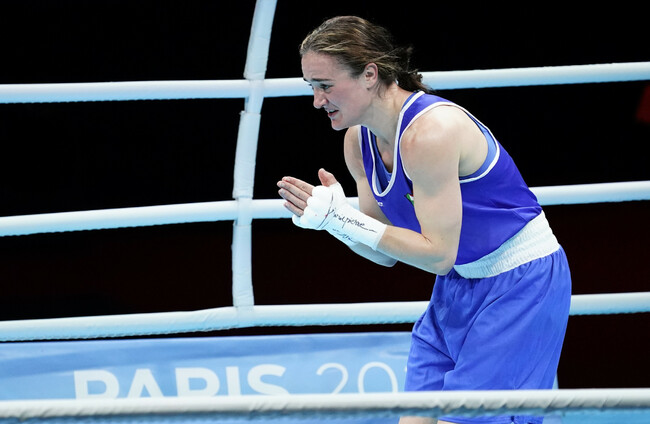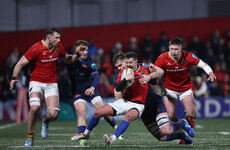LONG BEFORE VACCINES became synonymous with international travel, there was a saying in boxing: a right hand will take you around the block but a jab will take you around the world.
Ireland’s seven-strong team of boxers landed in Tokyo last week and, as far as yesterday’s draw, there have been no pharmacological scandals to report — which means they are already off to a better start than their Rio 2016 counterparts.
There should be no side effects from the omnishambles of five years ago, either. Only Brendan Irvine — then a youngster, now team captain — remains from the Rio wreckage, a whole new cast alongside him who should not be tasked with ‘setting the record straight’ or anything of the sort: that could have been done solely by the likes of Katie Taylor, Michael Conlan and Joe Ward for whom the 2016 Games went so badly for various reasons. But they’re gone. This is the Olympics of Kellie Harrington, of Michaela Walsh, of Aoife O’Rourke; of Emmet Brennan, of Aidan Walsh, of Kurt Walker and of a more mature Irvine.
There has been a price paid for Rio, even aside from the reputational damage that accompanied Michael O’Reilly’s doping scandal and the fact that Ireland’s greatest ever Olympic team on paper returned home empty handed.
Whereas usually boxing is similar to most Olympic sports in that it occurs mostly under the radar for four years before grabbing its portion of mainstream attention, after 2016 it seemed to be more so consigned to Hell on some subconscious level. So much so that outside of former world champion and women’s 60kg top seed Harrington, a team consisting of two European champions (O’Rourke, Walker) and a silver medalist (Michaela Walsh) from the 2019 European Games is largely unknown, even if it still carries with it the residual weight of expectation placed upon every Irish boxing team by the public every four years.
Six of the seven Irish boxers at Tokyo have won at least one major international medal since Rio, while at underage level, the success has remained extraordinary to the point of being taken for granted. As recently as a month ago, Dean Clancy won gold at the European U22s — but this might be the first you’re reading about it unless you’re from his native Sligo. Contrast that with the heroics of our underage runners at their equivalent tournament last week, when even Ireland’s first gold by the incredible Rhasidat Adeleke felt like an altogether more national story.
The fact that the sport responsible for over half of the country’s 31 total Olympic medals didn’t get even a cameo in RTÉ’s summer-of-sport look-ahead is unintentionally a fairly comical representation of the regard with which it’s held in Ireland, especially since montage must-have Katie Taylor turned pro in 2016.
All of that said, on an administrative level, the past five years for Irish amateur boxing have been far from perfect.
Just as was the case five years ago, this Olympics take place against a backdrop of IABA in-fighting, with a document designed to undermine director Bernard Dunne and the High Performance Unit (HPU) released anonymously just three months before the Games.
Meanwhile, about 15 fighters who would have been considered among Ireland’s top amateurs — either at underage or senior level — opted to turn pro rather than seek Tokyo qualification over the past five years. These included longtime team captain and genuine all-time great Joe Ward who bizarrely ditched the Irish vest just a year out from the originally scheduled Games, as well as would-have-been serious Olympic prospects Gary Cully (2017), Sean McComb (2018) and James McGivern (2020).
Supremely talented middleweight Michael Nevin, the successor to fellow Portaloise man O’Reilly, fell away from the HPU during the pandemic; he had already boxed — and won — in his opening bout at the European qualifiers in London last March, meaning Ireland could not replace him with a new entry upon the qualifiers’ resumption in Paris 15 months later. Longtime super-heavyweight vest-holder Dean Gardiner, too, opted out for personal reasons just seven months before the Games and couldn’t be tempted back. (He was, however, replaced in the qualifiers in June as he hadn’t yet fought in London last March when that tournament was postponed).
And yet despite the the complete changing of the guard in 2016, and the subsequent bleed of yet more prospects from the conveyor belt in the intervening five years, and the lack of a men’s 75kger, Dunne, Zaur Antia and co. have still managed to qualify the second highest number of boxers that Ireland has ever sent to a Games, behind only the eight who went to Rio last time out.
It speaks to their ability as a coaching setup but, more pertinently, to the efforts of volunteers in clubs up and down the country who continue to nurture and churn out talent at a rate Irish boxing could once have only dreamed of.
The problem is that more countries have caught up and surpassed us than was the case between 2008 and 2016: through years of heavy investment, other European nations without significant boxing pedigree have ostensibly ‘done an Ireland’, or are trying to, while the likes of Uzbekistan have evolved from an emerging force into a superpower. It will be harder this year to win an Olympic boxing medal than it ever has been before.
This reality was compounded by the draw yesterday, which determines so much in boxing’s Olympic-medal stakes and, by pure chance, was incredibly harsh to Ireland where in the past it has actually been reasonably generous: so much so that for Ireland to win even one boxing medal at these Games would constitute a success, whereas in 2012 that would have felt underwhelming — and in 2016 winning none justifiably sparked an inquisition.
Their best hope lies with Kellie Harrington, the one fighter who probably didn’t need the draw to be kind to her and yet has — relative to her legitimately world-class ability — the most straightforward path towards at least bronze. She begins this day week at 3am, when she’ll first face either v Rebeca Nicoli of Italy or Esmeralda Falcón of Mexico.
In the men’s 69kg division, Aidan Walsh has a decent chance of a bolt-from-the-blue medal having received a random bye into the last 16 due to the uneven number of competitors, as well as a favourable draw. First up for the Belfast welterweright, it’s either Eswatini’s Thabiso Dlamini or Cameroonian Albert Mengue Ayissi (Tuesday, 3:30am).
Conversely, his older sister, Michaela, the fourth seed in the women’s 57kg category and Ireland’s leading medal hope alongside Harrington before the draw, will now require a career-best performance to even make the quarter-finals. She’s more than capable of producing it, but cards on the table, she’ll be up against it when she squares off with either Italy’s Irma Testa — against whom she has both won and lost this year — or her 2019 World Championship conqueror, Liudmilla Vorontsova of Russia, for a place in the last eight (Monday, 6:27am).
So too will be European champions Walker and O’Rourke. The former gets Ireland under way against Spanish former European medalist Jose Quiles Brotons at 4:03am on Saturday and his prospective path towards a medal would only get harder from there. The latter faces an uphill task in the shape of China’s Li Qian, the 2018 World Champion, reigning Asian champion and a Rio 2016 bronze medallist (Wednesday, 10:18am).
Captain Irvine competes in the most talent-stacked division and while he should beat the Philippines’ Carlo Paalam just after midnight on Saturday, the road will get a lot rockier from there. As for Cinderella man Brennan, though his against-the-odds qualification is a success in its own right, it will take even further belligerence to see past formidable Uzbek Dilshodbek Ruzmetov, a silver medallist at the last World Championships and the reigning Asian champ (Sunday, 12:42pm).
But perhaps the one thing that this team should glean from the tragic class of 2016 is that in Olympic boxing, shocks routinely happen. This time, Ireland just need to be on the right side of them.
Draw for Ireland’s boxers at Tokyo Olympics
- Men’s 57kg Round of 32: Kurt Walker (Canal) vs Jose Quiles Brotons (Spain), Saturday 4:03am
- Men’s 81kg Round of 32: Emmet Brennan (Dublin Docklands) v Dilshod Ruzmetov (Uzbekistan), Sunday 12:42pm
- Men’s 52kg Round of 32: Brendan Irvine (St Paul’s) v Carlo Paalam (Philippines), Monday 12:03am
- Women’s 57kg Last 16: Michaela Walsh (Monkstown Antrim) v Irma Testa (Italy)/Liudmilla Vorontsova (Russia), Monday 6:27am
- Men’s 69kg Last 16: Aidan Walsh (Monkstown Antrim) v Thabiso Dlamini (Eswatini)/Albert Mengue Ayissi (Cameroon), Tuesday 3:30am
- Women’s 75kg Last 16: Aoife O’Rourke (Castlerea) v Li Qian (China), Wednesday, 10:18am
- Women’s 60kg Last 16: Kellie Harrington (St Mary’s) v Rebeca Nicoli (Italy)/Esmeralda Falcón (Mexico), Friday 3am













Very Sad. RIP.
RIP big man. He had a very bright future for the Blues. Very sad.
Sad Indeed. RIP Big Man.